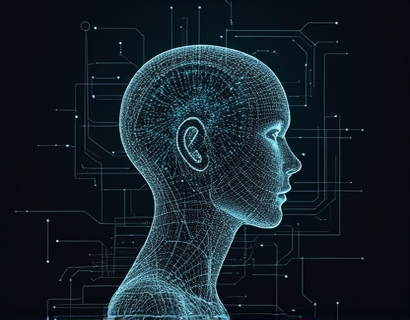Revolutionizing Business Analytics: The Synergy of AI and Blockchain
The integration of Artificial Intelligence (AI) and Blockchain technology is ushering in a new era for businesses seeking advanced user analytics and secure tracking solutions. This fusion leverages the strengths of both technologies to provide unparalleled insights into user behavior, thereby enhancing engagement and driving strategic decision-making. In this comprehensive guide, we will explore how this cutting-edge combination empowers businesses to navigate the complex landscape of data analytics with confidence and security.
Understanding AI and Blockchain in Analytics
Artificial Intelligence, particularly machine learning, excels in processing and analyzing vast amounts of data to uncover patterns and insights that are not immediately apparent. When applied to user analytics, AI can predict user behavior, personalize experiences, and optimize content delivery. On the other hand, Blockchain technology is renowned for its ability to provide a secure, transparent, and immutable ledger of transactions. When combined, these technologies can create a robust framework for user tracking and analytics that is both powerful and trustworthy.
Enhanced User Behavior Insights
The synergy of AI and Blockchain in user analytics begins with the collection and processing of data. AI algorithms can analyze user interactions across various touchpoints, from website visits to app usage and social media engagement. This data is then stored on a Blockchain, ensuring that it is tamper-proof and accessible only to authorized parties. The result is a comprehensive and accurate picture of user behavior, which can be used to refine marketing strategies, improve user experiences, and increase conversion rates.
For instance, AI can identify patterns in user navigation, such as which pages are most visited, how long users stay on each page, and which actions lead to higher engagement. This information, when combined with Blockchain's immutable record-keeping, allows businesses to make informed decisions based on real and verifiable data. The transparency provided by Blockchain ensures that data integrity is maintained, reducing the risk of fraudulent activities and enhancing trust among stakeholders.
Secure and Transparent Analytics
Security and transparency are paramount in the realm of user analytics. Traditional analytics platforms often struggle with data breaches and privacy concerns, leading to a loss of user trust. The Blockchain component addresses these issues by providing a decentralized and secure environment for data storage and sharing. Each transaction, or data point, is encrypted and linked to the previous one, forming a chain that is nearly impossible to alter without detection.
AI enhances this security by continuously monitoring the analytics system for any anomalies or suspicious activities. Machine learning models can detect unusual patterns that may indicate a security breach and trigger alerts for immediate action. This proactive approach ensures that user data remains protected, and businesses can operate with peace of mind.
Moreover, the transparency of Blockchain allows businesses to demonstrate to their users and regulators that data is being handled ethically and in compliance with regulations such as GDPR. Users can verify how their data is used and have control over their information, fostering a stronger relationship based on trust and transparency.
Personalization and Engagement Optimization
One of the most significant benefits of using AI and Blockchain in user analytics is the ability to deliver highly personalized experiences. By analyzing user behavior data stored on the Blockchain, AI can create detailed user profiles that capture preferences, interests, and habits. These profiles enable businesses to tailor content, recommendations, and offers to individual users, significantly enhancing engagement and satisfaction.
For example, an e-commerce platform can use AI to analyze a user's past purchases and browsing history to suggest products that align with their interests. This personalized approach not only improves the user experience but also increases the likelihood of repeat purchases and customer loyalty. The immutable nature of Blockchain ensures that these recommendations are based on accurate and consistent data, further boosting their effectiveness.
Additionally, AI can optimize the timing and delivery of these personalized interactions. By understanding the best times for engagement based on user behavior patterns, businesses can send notifications, emails, and push notifications when users are most receptive. This strategic timing can lead to higher open rates, click-through rates, and overall conversion rates.
Data-Driven Decision Making
The insights gained from AI and Blockchain analytics are not just useful for enhancing user experiences; they are also invaluable for strategic decision-making. Business leaders can leverage these insights to make informed decisions about product development, marketing campaigns, and resource allocation. The data provided is not only comprehensive but also reliable, thanks to the security and transparency of the Blockchain.
For instance, a retail company can use AI to analyze sales data, customer feedback, and market trends to identify opportunities for new product lines or improvements to existing ones. The Blockchain ensures that all data used in these analyses is accurate and unaltered, reducing the risk of making decisions based on flawed information. This data-driven approach can lead to more successful product launches, targeted marketing efforts, and optimized operational processes.
Furthermore, the ability to track the performance of these strategies in real-time allows businesses to adjust their approaches quickly. AI can monitor key performance indicators (KPIs) and provide actionable recommendations based on the latest data. This agility is crucial in today's fast-paced business environment, where the ability to adapt and respond to changes can mean the difference between success and failure.
Challenges and Considerations
While the combination of AI and Blockchain offers numerous advantages, there are also challenges and considerations that businesses should be aware of. One of the primary challenges is the technical complexity involved in implementing these technologies. Businesses may need to invest in training and hiring experts who can effectively integrate and manage AI and Blockchain systems.
Another consideration is the cost associated with these advanced technologies. Initial setup and ongoing maintenance can be expensive, especially for smaller businesses. However, the long-term benefits in terms of improved analytics, enhanced security, and better decision-making often justify the investment.
Privacy concerns remain a significant issue, despite the security features of Blockchain. Businesses must ensure that they comply with all relevant data protection regulations and that user consent is obtained for data collection and usage. Transparency in how data is used and the ability for users to control their information are essential for maintaining trust.
Case Studies and Real-World Applications
Several companies have successfully implemented AI and Blockchain solutions to transform their analytics capabilities. For example, a leading financial services firm used this combination to enhance customer onboarding and fraud detection. By analyzing user behavior data stored on the Blockchain, the firm could identify suspicious activities in real-time and take immediate action to prevent fraud. The AI-driven insights also helped in personalizing financial products and services, leading to higher customer satisfaction and retention.
In the healthcare industry, a major provider leveraged AI and Blockchain to improve patient data management and research. Patient records were stored on the Blockchain, ensuring their integrity and privacy. AI algorithms analyzed this data to identify trends and correlations that led to new insights in treatment methods and patient outcomes. This not only improved patient care but also accelerated medical research.
These case studies demonstrate the practical applications and benefits of integrating AI and Blockchain in user analytics. They serve as a testament to the potential of this technology combination to drive innovation and value across various industries.
Future Trends and Innovations
The future of AI and Blockchain in business analytics is promising, with ongoing advancements and new applications on the horizon. One area of focus is the development of more sophisticated AI models that can handle even larger and more complex datasets. These models will further enhance the depth and accuracy of insights provided to businesses.
Another trend is the integration of AI and Blockchain with other emerging technologies such as the Internet of Things (IoT) and 5G networks. This convergence will enable real-time data collection and analysis from a vast array of devices, providing businesses with unprecedented visibility into user behavior and operational efficiency.
Additionally, the evolution of privacy-preserving techniques, such as zero-knowledge proofs and homomorphic encryption, will continue to address privacy concerns while maintaining the benefits of Blockchain. These advancements will make it easier for businesses to comply with regulations and build trust with their users.
As the technology matures, we can expect to see more widespread adoption across industries, leading to a more data-driven and secure business landscape. The synergy of AI and Blockchain will continue to empower businesses to unlock new opportunities and stay ahead in a competitive market.




































